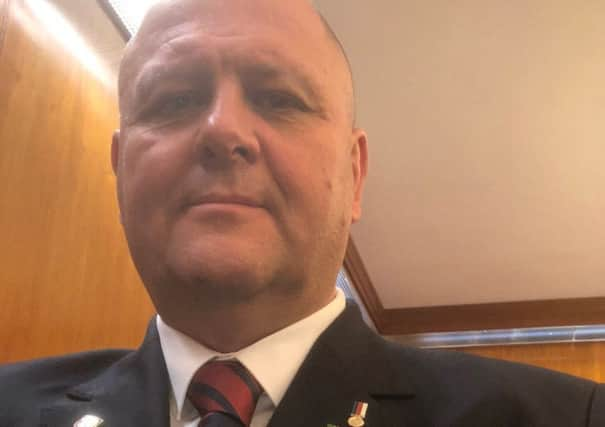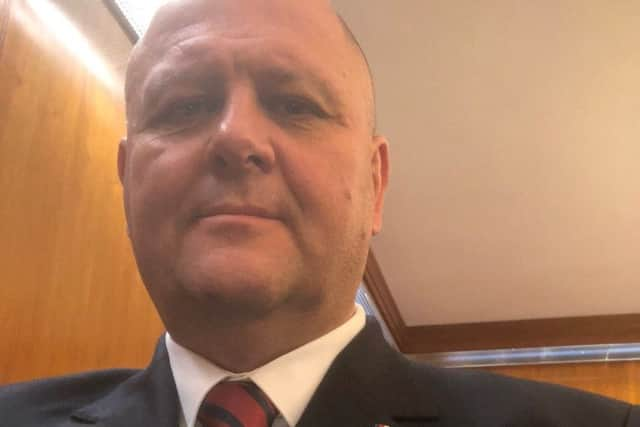Ex-serviceman who battled suicidal thoughts backs our military suicides campaign


The electrical engineer had left the Army more than ten years ago but had struggled since with guilt that his close friend had been killed in the Falklands War.
Fortunately, David was one of the lucky ones who, with the help of family and friends, pulled himself back from the brink – but others are not so lucky.
Advertisement
Hide AdAdvertisement
Hide AdToday, this newspaper joins other Johnston Press titles across the country in highlighting the hidden epidemic of veterans who go on to take their own lives.


A Johnston Press investigation found no comprehensive official records are kept of the number of British ex-servicemen and women dying as a result of suicide. The Government has been accused of ‘turning a blind eye’ to the problem, with people ranging from ex-military figures to families of those who have lost loved ones after they left active service calling for more to be done.
At least 16 veterans are feared to have taken their own life since January, of whom at least seven are known to have fought in Afghanistan and Iraq.
Many of the cases uncovered during the investigation revealed post-traumatic stress disorder (PTSD) as a major issue facing those who left the forces.
Advertisement
Hide AdAdvertisement
Hide AdDavid, now a West Sussex and Arun district councillor, from Felpham, bravely spoke out to share his experience of battling the condition – and has backed the nationwide call for action.
The 53-year-old joined the Army at the age of 16, studying electrical engineering at the Army Apprentices College, Chepstow. While he was not sent on active service, problems began when he struggled to cope with his friend being killed in the Falklands.
He said: “I basically went AWOL and was locked up in the jail for 28 days and I said, ‘I have got issues and I am suffering’. I remember them looking at me and they said ‘pull yourself together’.”
David left the Army in 1985, with his difficulties among several reasons he gave for calling it a day. “I left the Army and dealt with the feelings that would very often come back,” he said. Feeling unable to discuss his demons with anyone, David bottled them up. He said: “For me, the biggest issue was admitting that sometimes I didn’t want to be here because someone I knew was killed fighting for our country.
“It feels like a weakness and it’s embarrassing.”
Advertisement
Hide AdAdvertisement
Hide AdDavid said things worsened in 1996, some 11 years after he left the Army, shortly after his son was born. He said he began to feel inadequate as a father.
Describing the moment things came to a head, he explained: “I sort of disappeared and found myself walking along the seafront in Middleton, which was my comfort place. But I was wandering in the sea and I don’t remember doing it. When I got home everyone from the police to the doctor was there. It was almost surreal.”
David received six months’ psychiatric help, which talked him through how to cope with any issues which came into his mind.
He praised his wife, Alison, for being his ‘rock’, for ‘never giving up’ on him and for helping him overcome PTSD. Now, more than 20 years after his lowest point, he has backed calls for more to be done about veterans suffering from the condition.
Advertisement
Hide AdAdvertisement
Hide AdIndependently from the Johnston Press Investigations campaign, he is petitioning the Government to do more to identify PTSD in service veterans. His petition urges the forces, NHS and Government to work more closley – visit the website petition.parliament.uk/petitions/222126 for more details.
David said: “It is a national disgrace that we lose these heroes every day because they are allowed to be ignored.”
At a local level, David is set to back a motion up for debate at County Hall tomorrow (Wednesday, July 18) acknowledging the impact of PTSD on veterans and strengthening the council’s commitment to its military covenant.
Backing this newspaper’s call for action, he said the Government should do better in tracking ex-military suicides, so it could fully understand the scale of the problem. “I think it is an easy thing to hide from,” he said. Struggling veterans also needed to be encouraged to talk about their troubles, David argued, admitting it was often difficult for them to accept help, as he did.
Advertisement
Hide AdAdvertisement
Hide Ad“Some guys won’t accept help,” he said. “There are then the others who sit there and say nothing or do nothing, even though you can see they are almost melting inside.
“At some point everything explodes and you need to stop that happening.”
Call the 24-hour Combat Stress helpline on 0800 138 1619 to talk to someone if you are a veteran or have concerns about a loved one. Serving personnel can call the charity on 0800 323 4444. Alternatively, text 07537 404719 or email [email protected]
More stories as part of this investigation